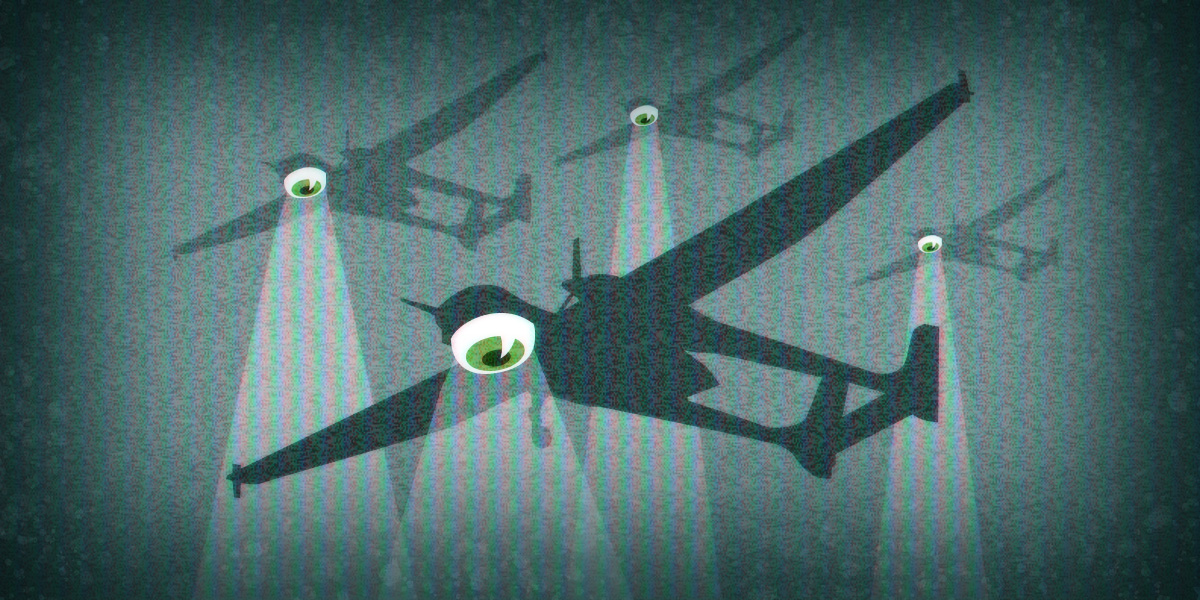
A federal statute authorizes the Pentagon to transfer surveillance technology, among other military equipment, to state and local police. This threatens privacy, free speech, and racial justice.
So Congress should do the right thing and enact Representative Ayanna Pressley’s amendment, Moratorium on Transfer of Controlled Property to Enforcement Agencies, to H.R. 4350, the National Defense Authorization Act for Fiscal Year 2022 (NDAA22). It would greatly curtail the amount of dangerous military equipment, including surveillance drones, that could be transferred to local and state law enforcement agencies through the Department of Defense’s “1033 program.” It has already placed $7.4 billion in military equipment with police departments since 1990.
The program includes both “controlled” property, such as weapons and vehicles, and “uncontrolled” property, such as first aid kits and tents. Pressley’s amendment would prevent the transfer of all “controlled” property, which includes “unmanned aerial vehicles,” or drones. It also includes: Manned aircraft, Wheeled armored vehicles, Command and control vehicles, specialized firearms and ammunition under .50 caliber, Breaching apparatus, and Riot batons and shields.
Even without the Department of Defense landing drones into our communities, police use of these autonomous flying robots is rapidly expanding. Some police departments are so eager to get their hands on drones that they’ve claimed they need them to help fight COVID-19. The Chicago Police Department even launched a massive drone program using only off-the-books money taken through civil asset forfeiture.
We know what will happen if police get their hands on more and more military surveillance drones. Technology given out on the condition that it can only be used in “extreme” circumstances often ends up being used in everyday acts of over-policing. And police have already used drones to monitor how people exercise their First Amendment-protected rights.
After the New York City Police Department accused one activist, Derrick Ingram, of injuring an officer’s ears by speaking too loudly through his megaphone at a protest, police flew drones by his apartment window—a clear act of intimidation for activists and protestors. The government also flew surveillance drones over multiple protests against police racism and violence during the summer of 2020. When police fly drones over a crowd of protestors, they chill free speech and political expression through fear of reprisal and retribution from police. Police could easily apply face surveillance technology to footage collected by a surveillance drone that passed over a crowd, creating a preliminary list of everyone that attended that day’s protest.
With the United States ending its multi-decade occupation of Afghanistan, military equipment once used in warfare is now inching closer to re-deployment onto U.S. streets. The scaling back of military involvement in Iraq coincided with a massive influx of weapons, armed vehicles, and other Department of Defense surplus being fed directly into police departments. We must prevent a repeat of history.
In 2015, after public reaction against militarized police in Ferguson, Missouri, President Obama made a few reforms to the 1033 program. Specifically, he banned transfer to the homefront of armored vehicles, weaponized aircraft and vehicles, weapons of over a specific caliber, grenade launchers, and bayonets. But this did not go far enough to ensure that section 1033 will not contribute to the mass surveillance of people on U.S. soil.
We’re calling on the public and members of Congress to support Ayanna Pressley’s amendment, the Moratorium on Transfer of Controlled Property to Enforcement Agencies, to H.R. 4350.
* This article was originally published here
HELP STOP THE SPREAD OF FAKE NEWS!
SHARE our articles and like our Facebook page and follow us on Twitter!




0 Comments